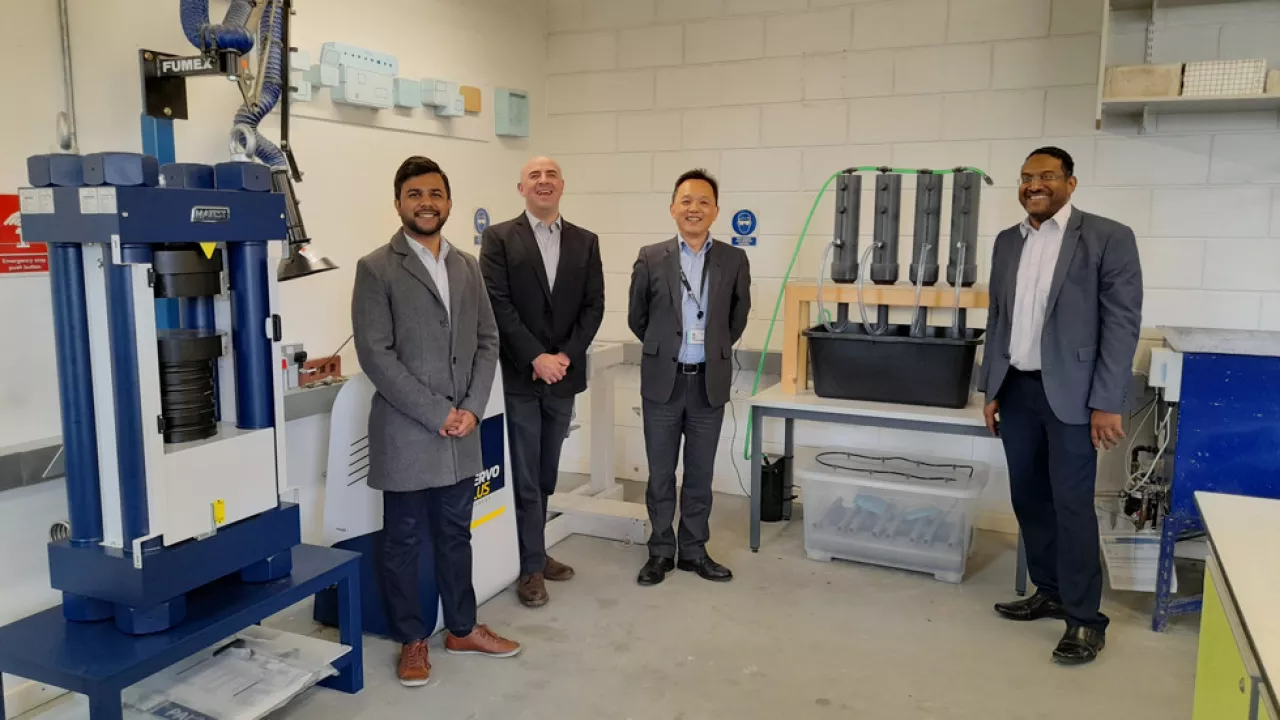UEL labs used to test industry standard self-healing concrete
UEL labs used to test industry standard self-healing concrete
Published
22 April 2022
Share
A brand new state-of-the-art concrete testing facility opened at the University of East London (UEL) will work with construction industry leaders to test and develop sustainable self-healing concrete.
The new facility is part of the refurbished material and structural testing laboratories at UEL, which are fully equipped to provide support services to the construction industry.
Self-healing concrete uses bacteria and micro-organisms which produce limestone when water seeps through the natural cracks within its concrete structure. The limestone hardens and autonomously repairs cracks within the concrete.
The lab will use machines to create cracks in the concrete which mimic natural cracks in real structures and test their reactions to water exposure.
The testing process can take up to six weeks and the micro-structure is then examined by UEL's Scanning Electron Microscopy (SEM) and X-Ray Diffraction Equipment (XRD) facilities.
"A key challenge facing the construction industry is that we cannot use materials which are no longer sustainable," said Dr Ali Abbas, associate professor at UEL.
"Current design codes accept cracks in concrete providing they are smaller than 0.3mm, as that does not affect structural safety. Our work will attempt to reduce larger cracks of 1mm to the acceptable level or remove them entirely.
"By testing the effectiveness of self-healing concrete, we can help industry leaders develop a more sustainable and safer material, reducing the need for maintenance and the impact that this has on the environment," he concluded.

Boupda Astrid MSc Structural Engineering, tests the Lytag product
The new testing lab at UEL will work with industry leaders such as JP Concrete and Lytag Lightweight Solutions to test the structural performance of their self-healing concrete products by measuring the penetrability of water within the concrete cracks.
The lab was opened at an event hosted by Professor David Tann, dean of the School of Architecture, Computing and Engineering, Professor Abbas and special guests including Vighnesh Daas director of innovation and sustainability at JP Concrete and Barry Mellor, commercial and technical manager at Lytag Lightweight Solutions.
The facilities will provide students with opportunities to work with industry leading products and develop and test their own work. The results of testing self-healing concrete will also be reflected in our curriculum.
"A key challenge facing the construction industry is that we cannot keep using the same the materials which are no longer sustainable," said Barry.
"The aim of our collaboration with UEL is to enable specifiers and contractors to test materials within the built environment that focus on sustainability within construction products.
"UEL's labs and facilities will allow new combinations of materials, such as Lytag which is made from a Power Station by product, to have a quantifiable value to the construction industry," he continued.
"Our collaboration with UEL is a good example of how industry and academia can come together to address key challenges such as those from climate change and to ensure the construction industry responds with suitable solutions,” added Vighnesh.
For more information see our engineering course pages at the University of East London.
Share
Communications team
Contact us for press and interview requests
